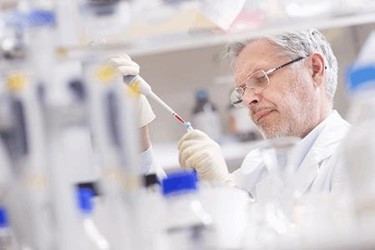High-Throughput Preformulation Development Platform For Biologics

The early stages of formulation development of biologics, such as monoclonal antibodies (mAbs), focus on screening various solution conditions to ensure stability of the protein during transport, storage, and delivery to patients. The current Quality by Design (QbD) approach includes defining quality attributes of the candidate drug and testing the excipients, buffers, and other formulation parameters which possibly impact stability. Typically, in early development, the quantity of protein available for studies is limited, and a dataset is required to expedite Tox- and IND-enabling stability studies. In this study, the team implemented a high-throughput formulation development approach for sample preparation and sample analysis.
A full-factorial screening Design of Experiment (DoE) was executed using a robotic automation system to prepare formulations in standard 96-well microplates from stock solutions of buffers and proteins. Various high-throughput stability indicating assays, as well as conformation and colloidal stability predicting assays, were used to gather data before and after a week of thermal stress or eight hours of mechanical stress. Statistical analysis of the data identified suitable formulation parameters such as buffer type, pH range, and excipients that enhanced stability of the mAb. Thus, the high-throughput formulation development enabled a simple and less labor-intensive screening of a broad range of conditions in considerably less time, making the formulation process more efficient and economical.
Get unlimited access to:
Enter your credentials below to log in. Not yet a member of Bioprocess Online? Subscribe today.
